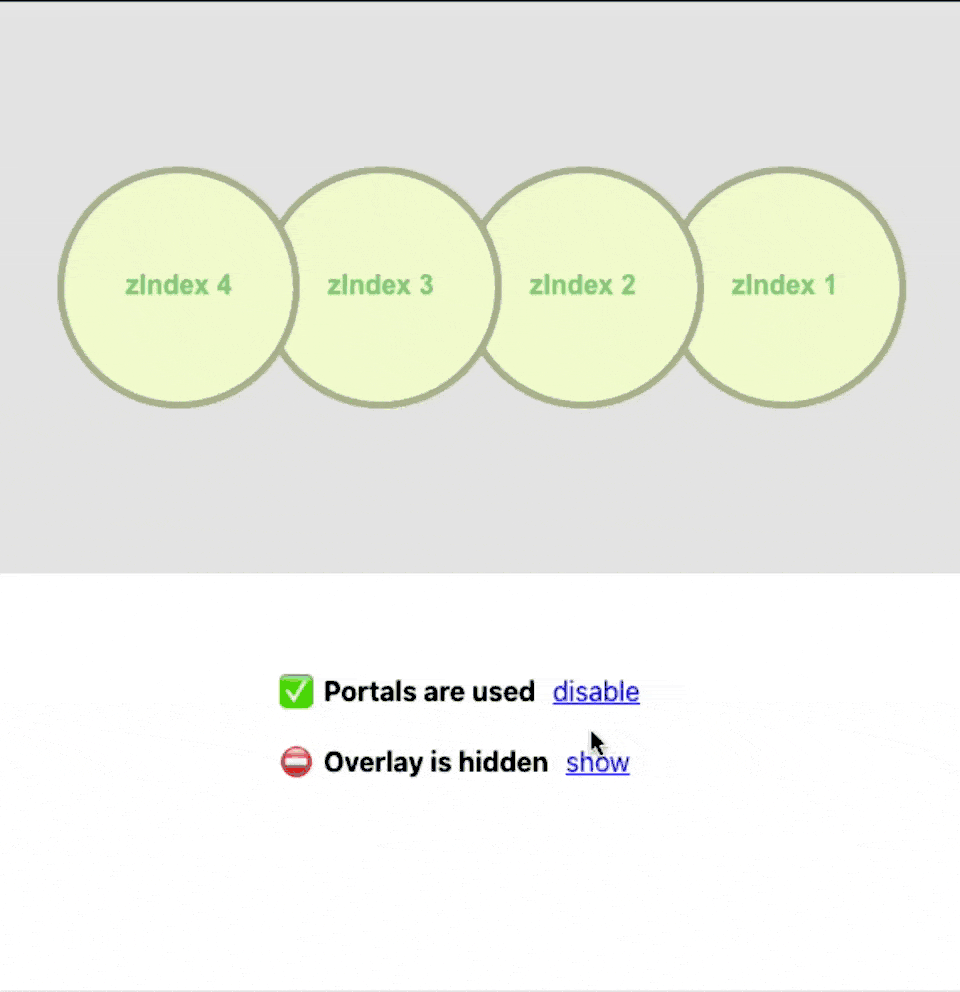Portals support for react-konva
Teleport your canvas components across groups, layers and canvas elements regardless your component hierarchy. This
library provides portals support for react-konva components and may
facilitate in a complex canvas scene compositions.
Example projects link1, link2.
yarn add react-konva-portalIMPORTANT: Please note, this package depends on konva and react-konva packages.
Replace react-konva root component with Stage from react-konva-portal. Please use it as a drop-in replacement of
the original one. It is required in order for portals to work.
Any React content inside
<Portal />will be rendered outside of its tree hierarchy.
import React, { Component } from 'react';
import { Rect, Text, Layer } from 'react-konva';
import { Stage, Portal } from 'react-konva-portal';
class PortalExample extends Component {
render() {
return (
<Stage width={400} height={400}>
<Layer id="example-layer">
<Portal>
<Text text="This content will be rendered in a Portal (above overlay-layer)." width={400} height={400} />
</Portal>
</Layer>
<Layer id="overlay-layer">
<Rect fill="#c1f7ff" width={400} height={400} />
</Layer>
</Stage>
);
}
}Optionally, You may refine desired render destination with containerId and zIndex.
With
containerIdpointing toLayer/Groupcomponent fromreact-konva-portalin your app tree.You may also provide stacking order in container with
zIndexproperty.
import React, { Component } from 'react';
import { Rect, Text } from 'react-konva';
import { Group, Stage, Portal, Layer } from 'react-konva-portal';
function Content({ text }) {
return <Text text={text} width={400} height={400} />;
}
class TeleportExample extends Component {
render() {
return (
<Stage width={400} height={400}>
<Layer id="content-layer">
<Portal containerId="another-layer">
<Content text="Will be rendered as a children of <Layer id={'another-layer'} />" />
</Portal>
<Portal>
<Content text="Will be rendered as a children of default portals layer in `Stage`" />
</Portal>
<Portal containerId="some-group" zIndex={100}>
<Content text="Will be rendered as a children of <Group id={'some-group'} /> with specified stacking order" />
</Portal>
<Portal containerId="some-group">
<Content text="Will be rendered as a children of <Group id={'some-group'} />" />
</Portal>
</Layer>
<Layer id="another-layer">
<Group id="some-group" />
</Layer>
</Stage>
);
}
}This package exposes Stage, Portal, Layer and Group React components.
import { Group, Stage, Portal, Layer } from 'react-konva-portal';Root component for working with canvas scene composition. It accepts all Konva.Stage props and forwards the original
ref.
| Prop | Note |
|---|---|
| portalLayerProps | Optional. Accepts Konva.LayerConfig and forwards it to portals containing Layer instance from react-konva. |
Special, own children teleporting component.
| Prop | Note |
|---|---|
| containerId | Optional. Accepts string value and should match id prop of Group or Layer in order for content to be rendered. |
| zIndex | Optional. Specifies stacking order in container. |
| children | Required. This property holds "travelling" content. |
Container component with portals' content hosting capabilities. It accepts all Konva.Layer props and forwards the original
ref.
| Prop | Note |
|---|---|
| id | Required. Accepts string value and should be unique. |
Container component with portals' content hosting capabilities. It accept all Konva.Node props and forwards the original ref.
| Prop | Note |
|---|---|
| id | Required. Accepts string value and should be unique. |
Use the issue tracker and/or open pull requests.
MIT © papahigh
